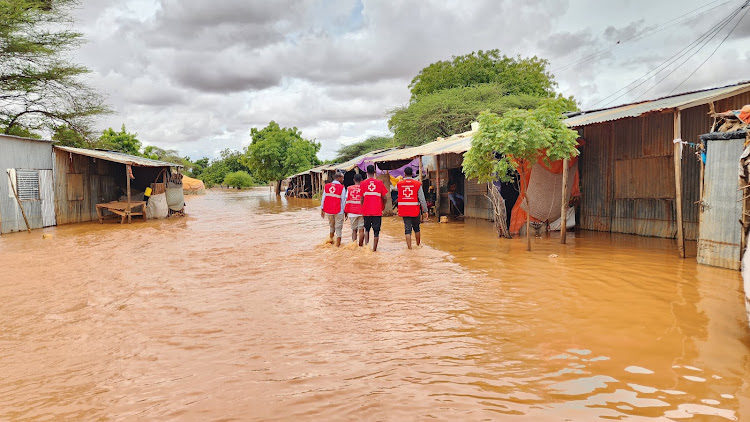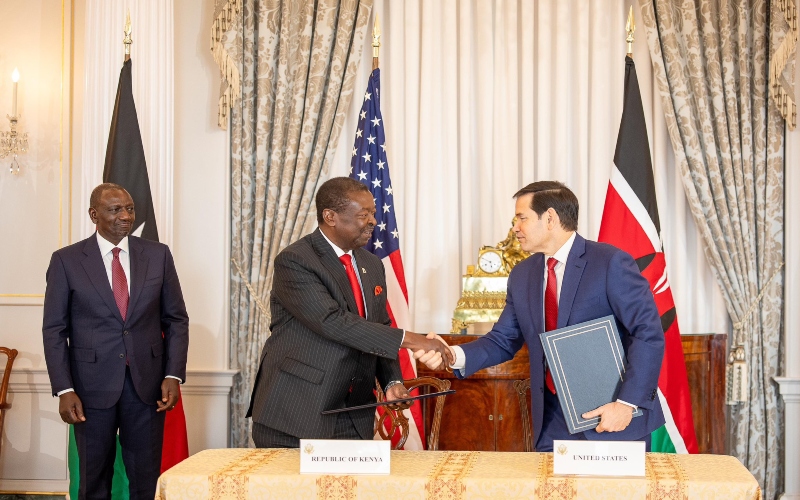Global warming expected to surpass normal temperatures, likely to cause disaster

In addition, more than 16.3 million people lacked sufficient water for basic needs, exacerbating demands for Water, Sanitation, and Hygiene (WASH) services, nutrition, and healthcare.
The latest report from the World Meteorological Organization indicates an 80 per cent likelihood that the annual average global temperature will temporarily exceed 1.5°C above pre-industrial levels at least once in the next five years.
Despite Africa contributing only about four per cent of global carbon emissions, the continent bears the brunt of climate change's effects, suffering disproportionately despite being the least responsible for global warming.
More To Read
- 2025 set for second-hottest year on record
- Nyeri climate change activist Truphena Muthoni attempts 72-hour tree-hugging record
- UN’s Guterres vows to push for Palestine two-state solution, says he will ‘not shut up’
- Green economy now second-fastest global growth frontier, value hits Sh646.4 trillion - report
- Supporting Africa’s drylands: Insights from the pastoralists who call them home
- What’s at stake in the COP30 negotiations?
Global warming leads to significant environmental changes that profoundly impact human health. These include rising sea levels resulting in coastal land loss, altered rainfall patterns, increased risks of droughts and floods, and the potential for displacement and food crises.
According to the World Health Organization (WHO), climate change currently causes at least 150,000 deaths annually, a figure projected to double by 2030, highlighting the severe health consequences expected.
From late 2020 to early 2023, the Horn of Africa endured its worst drought in 40 years, following five failed rainfall seasons. This crisis left seven million children under five malnourished and in urgent need of nutritional assistance across Ethiopia, Kenya, and Somalia.
As of December 2022, more than 36.5 million people were affected by severe drought, with over 20 million facing acute food insecurity.
In addition, more than 16.3 million people lacked sufficient water for basic needs, exacerbating demands for Water, Sanitation, and Hygiene (WASH) services, nutrition, and healthcare.
Protection risks, such as gender-based violence (GBV) have escalated as women and girls must travel longer distances to access water. The drought's severity is anticipated to worsen in the coming months, with potentially catastrophic consequences.
Predictions synthesized by the World Meteorological Organization for 2024–2028 suggest that each year's global mean near-surface temperature will range from 1.1°C to 1.9°C above the 1850–1900 baseline.
There is an 80 per cent likelihood that at least one of these years will set a new temperature record, surpassing 2023, currently the warmest year on record.
United Nations chief António Guterres has called for countries to ban fossil fuel advertising, marking a pivotal moment in addressing climate change during his speech at World Environment Day in New York City. This is the first time the U.N. leader has singled out the advertising industry in climate advocacy.
"Fossil fuels are not only poisoning our planet; they’re toxic for your brand. Many in the fossil fuel industry have shamelessly greenwashed, even as they have sought to delay climate action with lobbying, legal threats, and massive ad campaigns." His call marked a significant step in global climate advocacy.
Global climate goals, agreed upon by world leaders, aim to limit warming to 1.5 degrees Celsius (2.7 degrees Fahrenheit) by 2100 to mitigate severe climate disruptions that could exacerbate hunger, conflict, and drought worldwide.
Developing nations, home to millions vulnerable to climate impacts, have long championed this target. During the 2015 Paris climate negotiations, these nations pressed industrialized countries to improve upon the earlier 2 degrees Celsius goal, given their greater responsibility for greenhouse gas emissions since the Industrial Revolution.
At COP28, Africa secured a significant "Win" highlighting its climate needs and priorities. This included increased financial commitments for adaptation, mitigation, renewable energy projects, and initiatives addressing displacement and food insecurity.
This recognition was crucial amidst record-high temperatures globally, with Africa witnessing severe impacts such as over 15,700 deaths from extreme weather events, widespread food and water shortages, and heightened disease risks.
A major achievement at COP28 was the approval of the Loss and Damage Fund on day one in Dubai, hosted by the World Bank. This fund aims to aid developing countries facing severe climate-related losses.
With approximately $700 million (Sh91.1 million) pledged, its next steps involve defining its scope and mobilizing further funds, potentially transforming support for African nations on the frontlines of climate change.
Top Stories Today












































